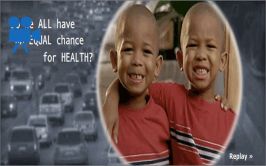Unnatural Causes: Is inequality making us sick?
A seven-part documentary series, Unnatural Causes explores various elements of racial and socioeconomic determinants of health across the US. The series and accompanying impact campaign aim to enlarge the public discourse about health by increasing awareness of how social inequities, racism and disempowerment influence health outcomes and have real associated costs. Unnatural Causes also emphasizes a population health framing, illustrating health and well-being is more than a matter of making good choices and access to quality care. The series contends that solutions need to be sought through broader equitable social policies.
The opening episode, In Sickness and In Wealth (approx. 1 hour), presents the series’ overarching themes. Each subsequent half-hour episode, set in a different ethnic community (e.g. Bad Sugar connects diabetes, oppression and empowerment in two Native American communities), provides deeper insight into how social conditions affect population health and how some communities are working to improve health and health policies.
As part of larger impact campaign, the documentary is accompanied by various tools including: a discussion guide for public screenings and community events; a policy guide to support organizations to plan and implement strategies for policy change; and an action toolkit to use the series to advance a health equity agenda.
Use this resource to
- link health discussions to social and economic policies.
- support communities and organizations with examples of policies that have positively effected health equity
- provide communities and organizations with tools to emulate these successful approaches
- catalyze community discussions around policy initiatives related to health equity and the social determinants of health
Reference
National Association of County & City Health Officials. 2008. Unnatural Causes. Retrieved from www.unnaturalcauses.org
Tags: Community engagement, Health literacy, Healthy public policy, Racism/racialization, Socioeconomic status, Participate in policy development, Video
